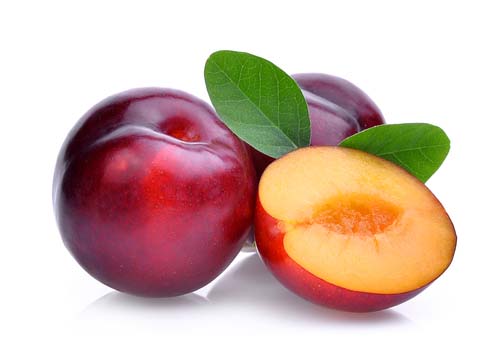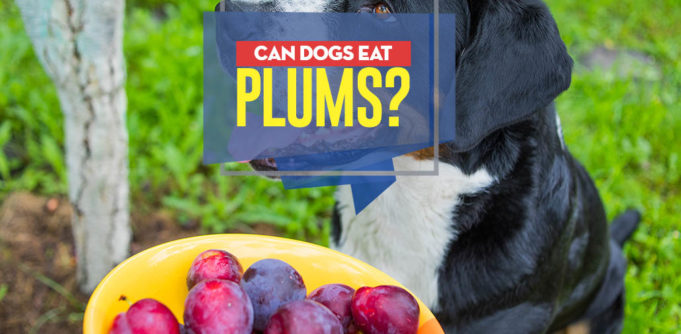Plums are a juicy, sweet fruit that is often associated with summertime. This fruit may have been one of the first domesticated by humanity. It comes from a diverse group of fruit species and can range in flavor from sweet to tart. But can dogs eat plums just as we can, and are plums good for dogs?
If you've been wondering, “can I give my dog plums,” the answer is YES – dogs can have plums, as long as you take some necessary precautions. Moderation is key when feeding plums to dogs, and you should never give whole plums to your pet.
In this article, we'll discuss plums and prunes in greater detail. We'll talk about the benefits and risks of plums for dogs, can dogs have plums in any shape, are plums good for dogs to consume and are plums bad for dogs in any way.
ALSO READ: The Best Dog Food for Dogs With Diarrhea and Loose Stools
What are plums?
Plums are a fruit with a waxy, smooth skin and firm, juicy flesh. It is typically eaten in its natural form, but can also be used for canning, cooking, and desserts. This fruit is also tasty when dried (called prunes) or pickled.
Plums have many health benefits for humans, some of which have been proven, and some of those may also extend to dogs.
This is what fresh plums look like:

When you're buying plums in a store, they are available either pitted with the pit intact in the center of the fruit, or de-pitted, where the pit has been removed from the fruit. When using plums for dogs, you should always use de-pitted plums only (or remove the pit yourself). But can dogs have plums when they're de-pitted all the time? Let's see.
RELATED: Can Dogs Eat Pumpkin Seeds?
Plums for Dogs 101
Can Dogs Eat Plums?
 So, can dogs eat plums and reap some of the benefits? Yes, you can feed your pet fresh plums, although there are some necessary precautions to keep in mind. As with any food, but especially with fruit, introduce the plums into your dog's diet slowly and in small amounts. Otherwise, digestive upset may occur.
So, can dogs eat plums and reap some of the benefits? Yes, you can feed your pet fresh plums, although there are some necessary precautions to keep in mind. As with any food, but especially with fruit, introduce the plums into your dog's diet slowly and in small amounts. Otherwise, digestive upset may occur.
It’s also important to note that dogs should not eat pitted plums because of the toxic effects the pits have on canines. Additionally, the pits can pose a serious choking hazard. Now, let's take a look at what proven benefits plums may have on people and dogs.
Here's what we currently know about this popular fruit:
- Plums prevent constipation and improve stools (1, 2, 3)
- Plums lower blood sugar levels and risk of diabetes (4, 5, 6)
- Plums in dried form improve bone health (7)
- Plums improve heart health (8, 9, 10)
- Plums are high in antioxidants and anti-inflammatory compounds (11, 12)
The above benefits have been tested in human and animal (mice) trials, but none of the studies were performed with dogs, so the jury is out on this one still. Theoretically, it's possible that some of the health benefits of plums can be transferred onto dogs. So what are the possible benefits of plums for dogs, and can dogs have plums safely?
READ THIS: The Best Weight Loss Dog Food for Fat Dogs
5 Benefits of Plums for Dogs
1. Plums are high in fiber and good for digestive health and lower cholesterol.
Fiber, both soluble and insoluble, is a crucial component for digestive and intestinal regularity, and a decent amount of both kinds of fiber can be found in plums. The insoluble fiber prevents constipation, provides bulk, and reduces the risk of colon cancer.
Soluble fiber helps lower cholesterol levels in dogs by lowering the production of enzymatic acids involved in the creation of cholesterol in the liver.
2. Plums may improve dog's bone health and prevent arthritis.
Plums are an excellent source of Vitamin K. As a fat-soluble vitamin, Vitamin K is necessary for a dog’s overall health. It assists calcium in strengthening teeth and bones, as well as other biological processes.
Vitamin K also helps activate protein properties which promotes blood coagulation, preventing the development of blood clots.
3. Plums normalize sugar levels and promote weight loss.
With the help of its fiber, plums can help normalize blood sugar levels by slowing down the absorption of glucose in dogs after they’ve eaten. It promotes insulin sensitivity, which plays a role in preventing diabetes.
Plums help encourage a feeling of fullness after eating them by slowing down the rate at which food leaves the stomach. This sense of satiety helps cut down on overeating by the dog.
4. The Vitamin C in plums boosts dog's immune system.
Plums contain a significant amount of Vitamin C, an ascorbic acid and an antioxidant of critical importance to proper body functions. Vitamin C has been shown to increase the number of lymphocytes in the blood. Lymphocytes are a type of white blood cell responsible for immune system function.
5. Plums may also prevent or reduce the risk of major diseases.
The amount of Vitamin C in plums (as well as many other anti-oxidant and anti-inflammatory compounds) can help ward off major diseases and illnesses in canines.
Diabetes, heart disease, asthma, osteoarthritis, rheumatoid arthritis, and atherosclerosis are all medical conditions that may be prevented or reduced with the addition of vitamins and antioxidants found in high amounts in plums as demonstrated in studies above.
So, can dogs have plums?
Yes, your dog can eat plums in moderate amounts and as long as you feed only fresh plums with no added sugars or other additives, and with pits removed. While prunes (dried plums) are also fine for dogs, most store-bought prunes will often contain sugars so it's best to avoid them altogether.
RELATED: Is Ginger Good for Dogs?
2 Potential Side Effects of Plums for Dogs
1. Too many plums will cause gastrointestinal upset in dogs.
While most fruits and vegetables are good for dogs, too much of any food (even if it's healthy) can cause stomach distress, and especially for dogs, “too much” is usually very little. Too much fruit in particular may also result in additional gastrointestinal concerns. Plums eaten in excess can cause abdominal pains, vomiting, diarrhea, and constipation.
2. Plum pits pose a serious choking and internal hazard.
If you choose to give your dog plums, it’s vitally important that the plums not have pits. The pits in plums are choking hazards to dogs, especially small breeds, although large breeds can also be affected.
Additionally, the pits can have sharp edges, and if swallowed, can do damage to the esophagus, the stomach lining, and the intestines. In worst case scenarios, the pit can even cause a blockage within the intestine, prompting a life-threatening health issue.
A Word of Warning About Plums for Dogs
Aside from being a potential choking hazard, the pits in plums are also toxic to dogs. Plum pits contain cyanide, which is poisonous and can cause severe distress in animals. Although a dog would need to eat many pits to suffer cyanide poisoning, it still is a concern worth noting.
Look for these symptoms if you believe that your dog has cyanide poisoning:
- Difficulty standing or walking
- Muscle spasms and tremors
- Seizures
- Vomiting
- Excessive salivation
- Voiding of bladder and bowels
- Coma
To be on the safe side, make sure to feed your dog only de-pitted plums to avoid any possibility of cyanide poisoning.
Summary
Can Dogs Have Plums?
 In conclusion, can dogs eat plums and are plums good for dogs to consume? Yes, your pooch can eat plums and he may even benefits from this fruit, provided that the plum is de-pitted and fed in small amounts to allow diet adjustment to occur.
In conclusion, can dogs eat plums and are plums good for dogs to consume? Yes, your pooch can eat plums and he may even benefits from this fruit, provided that the plum is de-pitted and fed in small amounts to allow diet adjustment to occur.
On the whole, plums are highly nutritious and can provide some essential vitamins and minerals for your dog as well as good amounts of fiber. But always feed plus fro dogs in moderation, and remember to remove the pits and avoid any additives.
READ NEXT: 9 Superfoods for Dogs That Improve Their Health (According to Science)














